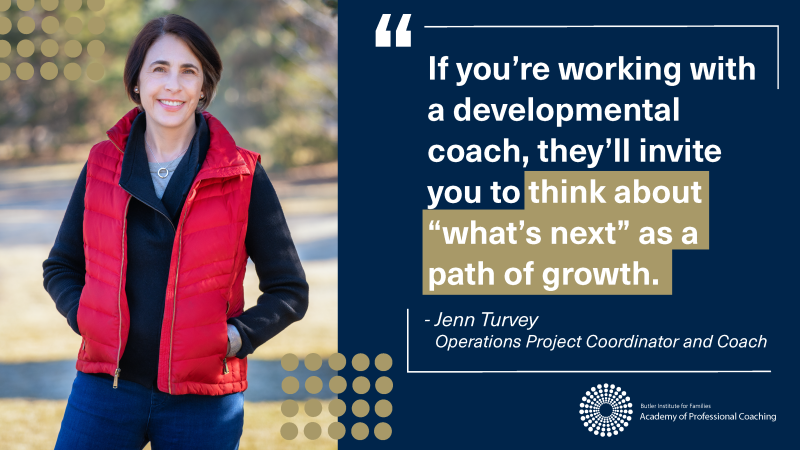After the bustle and swirl of holidays during November and December, the early months of the year bring peace I need to reflect on what’s ahead. In this time of possibility and new beginnings, you might also be asking yourself, “What’s next for me?”
That’s a coaching question! To help you discover the answer, your coach might propose a personality test, an assessment that identifies and goes deep on personality themes such as positivity, analytical, or strategic. These aspects of you are rooted in your life experience and your neurological wiring. They offer a deeply felt trueness that I call “you-context”.
If you’re working with a developmental coach, they’ll invite you to think about “what’s next” as a path of growth.
To start out your work together, they will engage you in a conversation to help you get specific about what you’re wanting and what’s getting in the way. You might tell your coach that this year you want to experience more energy and creativity, but are feeling scattered and burned out. Perhaps you share that you’re passionate about your job, and give 100% every day at work. Also, that you participate in several after-work commitments. The coaching goal emerging from that conversation might be to “increase balance and enjoyment in work and personal life.”
You might identify a conflict-avoidant tendency or a habit of pleasing to get by in life and work, which your coach will use as a foundation for these two practices: 1) On a daily basis, observe and reflect on my behaviors and motivations around taking on too much. 2) Twice weekly, experiment with saying no to requests that seem unreasonable to me.
From there, you embark on a journey of learning and growth through practice, and that “you-context” from your personality assessment is with you throughout. It kicks in by supporting your thought process as you observe your behaviors, habits, and change. It also supplies shared language and definitions for conversations with your coach who might ask, “Which qualities are showing up in this situation?” For you, referencing these qualities brings up positive emotions such as delight, pride, surprise, and recognition.
Practice is challenging. It takes you to unfamiliar terrain. Shakiness. Doubt. Mess-ups. Your personality themes are like stepping-stones, offering solidity while as you reach toward things that aren’t as easy or familiar. If you fall in the creek, you can reach for one of them.
Your coach knows that supporting and encouraging you are integral to your journey. They’ll offer you practices of acknowledging and celebrating your successes. They’ll congratulate you and give kudos.
Growth arrives in the form of new habits and shifts in ways of being. You notice your tendency to “just do everything myself,” and You leave a task for someone else. Or you ask for help. As you repeat these new actions, they begin to feel natural, and you experience a sense of ease and flow. This evidence of newly built effectiveness brings you satisfaction and pride.
Observing these shifts in your experience builds momentum and confidence, as does realizing you’ve met your goal.
What’s next for you this year?
***
Interested in becoming a developmental coach? Learn more about our accredited trainings on our Coach Training page!

